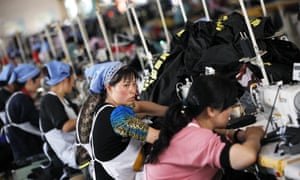
China’s flagship English newspaper has come under fire over the publication of a commentary claiming the type of sexual harassment allegedly perpetrated by Harvey Weinstein could never happen in China because of its cultural traditions.
Critics reacted swiftly and furiously to the article in the state-run China Daily, with many women saying they had been sexually harassed in China or pointing to prominent examples, many of which have previously gone viral.
Chinese state media often works to portray problems in the west as nonexistent in China, highlighting cases of police brutality, mass protests and high-profile cases of violence against women overseas. Crises abroad are often contrasted with positive domestic news, a key pillar of China’s propaganda machine.
As the hashtag #MeToo spread on social media around the world and women shared stories of their own experiences, the opinion piece written by a male Canadian-Egyptian teacher previously resident in China claimed the country faced no such issues.
The China Daily commentary said harassment was less common in China compared with western countries because “Chinese men are taught to be protective of their women. Behaving inappropriately toward women, including harassing them sexually, contradicts every Chinese traditional value and custom.”
“There’s the pervasive misogyny in Chinese society, and then add to that this huge government crackdown on feminism, so any women who wants to come forward needs to take a huge risk,” said Leta Hong Fincher, the author of a forthcoming book entitled Betraying Big Brother: China’s Feminist Resistance.
“There’s also state media aggressively pushing traditional gender norms, where women are supposed to play these roles of a good wife and good mother who should be preparing themselves to have babies.”
Sophie Richardson, the China director at Human Rights Watch, blamed under-reporting in China on censorship:
More than a third of university students polled in one study said they had experienced sexual violence or harassment, and up to 70% of female factory workers in the southern city of Guangzhou said they had experienced sexual harassment in the workplace, according to a 2013 study by China Labour Bulletin.
Others said the toxic environment that exists in Hollywood was pervasive in China.
Christoph Rehage, a film-maker who attended the Beijing Film Academy, wrote on Twitter:
Five feminist activists were detained on the eve of International Women’s Day in 2015 for planning to distribute leaflets on sexual harassment.
“Media coverage on gender topics is very important, hearing the voice of the victims is very important and this is how the entire community will become more aware of sexual harassment.”“Speaking about China, it’s very common in the workplace to use the power of a superior position in a coercive way that leads to sexual harassment,” said Xiong Jing, the executive director of the NGO Feminist Voice.
The problem was made worse, Xiong said, because many women were afraid or ashamed of telling their stories and neither the government and nor quasi-government NGO All China Women’s Federation collected statistics.
China enacted its first domestic violence law in 2015, but critics say the legislation’s key power of issuing restraining orders is not being correctly implemented. Chinese police resisted investigating cases of domestic assault for years, claiming it was a family matter.
With additional reporting by Wang Zhen


No comments:
Post a Comment